气候变化对欧洲西南部桤木开花物候的影响
IF 0.7
4区 生物学
Q3 PLANT SCIENCES
引用次数: 4
摘要
全球变暖影响植物的酚学,气候变化的影响将在植物分布的边缘更加强烈。这项工作的重点是伊比利亚阿尔德的气候范围(Alnus lusitanica Vít,Douda&Mandák)。伊比利亚半岛构成了欧洲黑赤杨(Alnus glutinosa(L.)Gaertn)全球群落分布的西南边缘。s.l.),而一些最温暖、最干燥的阿尔德树种群位于西班牙中部。采用基于统计的方法模拟温带树木的低温期和强迫积累期,分析了调节赤杨繁殖表型的临界温度相关期。我们的研究结果表明,在地中海气候中,秋季寒冷是赤杨最重要的热积累期,而强迫要求在短时间内得到满足。秋季温度与开花时间显著相关,该季节的寒冷单位直接影响赤杨开花的开始日期。在花粉季节的时间安排上观察到了积极的趋势,这意味着西班牙中部的赤杨开花略有延迟。这与2004-2018年期间的秋季变暖相吻合。如果这种变暖趋势持续下去,我们的研究结果预测,根据最乐观的排放情景,秋季最高气温每升高一度,开花开始日期就会推迟约3天。本文章由计算机程序翻译,如有差异,请以英文原文为准。
The effects of climate change on the flowering phenology of alder trees in southwestern Europe
Global warming impacts plant phenology and the effect of climate change will be more intensely experienced at the edges of a plant's distribution. This work focuses on Iberian alder's climatic range (Alnus lusitanica Vít, Douda & Mandák). The Iberian Peninsula constitutes the Southwestern edge of the global chorological distribution of European black alder (Alnus glutinosa (L.) Gaertn. s.l.), and some of the warmest and driest conditions for the alder population are located in the center of Spain. The critical temperature-relevant periods that regulate the reproductive phenology of alder were analyzed using a statistical-based method for modeling chilling and forcing accumulation periods in temperate trees. Our results reveal that autumn chilling was the most important thermal accumulation period for alder in a Mediterranean climate while forcing requirements are satisfied in a short period of time. Autumn temperatures were significantly correlated with the timing of flowering, and chill units during this season directly influence start-dates of alder flowering. A positive trend was observed in pollen seasons' timing, meaning a slight delay of alder flowering in central Spain. It coincided with autumn warming during the period 2004-2018. If this warming trend continues, our results predict a delay in the start-date of flowering by around 3-days for every degree increase in maximum autumn temperatures according to the most optimistic emission scenarios.
求助全文
通过发布文献求助,成功后即可免费获取论文全文。
去求助
来源期刊

Mediterranean Botany
Agricultural and Biological Sciences-Plant Science
CiteScore
2.40
自引率
10.00%
发文量
30
审稿时长
12 weeks
期刊介绍:
Mediterranean Botany (ISSNe 2603-9109), formerly Lazaroa, is a biannual journal that publishes original research studies in the field of Botany including plant systematics, vegetation ecology, biogeography, evolutionary biology, ecophysiology, community ecology, ethnobotany and conservation biology on Mediterranean biomes but also in interacting areas.
Mediterranean Botany is an OPEN ACCESS Journal, free of charges for any published article.
 求助内容:
求助内容: 应助结果提醒方式:
应助结果提醒方式:


